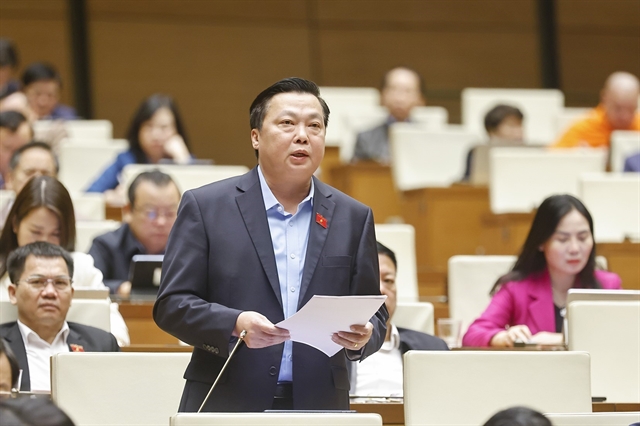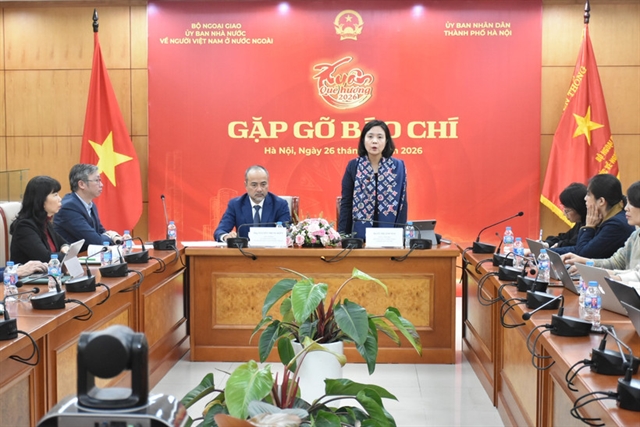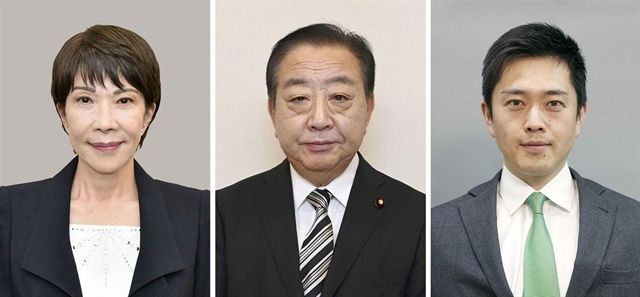 Politics & Law
Politics & Law


|
| Deputy Phạm Hùng Thắng from Ninh Bình Province gives opinion at the session. — VNA/VNS Photo Doãn Tấn |
HÀ NỘI — Education, higher education, vocational education laws and breakthrough development in education and training were among issues discussed by the National Assembly (NA) on Thursday.
Regulations related to decentralisation and delegation of authority for recruitment, reception, transfer, allocation, assignment and change of work positions for teachers, education management staff as well as employees in public education institutions attracted much attention from deputies.
Deputy Hoàng Văn Cường from Hà Nội said that the most decisive factor in having a good school is a good team of teachers who are dedicated, passionate about their profession and especially value professional honour.
Therefore, the most important step in recruitment is competitive exams.
A large competition must be created so that all candidates who want to become teachers in the same locality can compete fairly.
Cường believes that, for fairness and transparency, the local Department of Education and Training should organise a common exam for all schools recruiting teachers across the province to ensure a common standard for all candidates.
Based on the recruitment exam results, schools and communes only have to select the required number of teachers according to individual candidates' scores from highest to lowest.
Teachers who fail in one school can register to transfer to another school using the same exam results. This way, schools have more candidates to choose from, increasing the chances of selecting the best candidates.
"If each school or commune organises its own recruitment exam, the number of exam papers and exam boards will multiply. This not only causes waste but also results in uneven exam quality among schools, which could lead to uneven recruitment quality," Cường said.
He also noted that in the context of a rapid decline in the birth rate and strong migration, a mechanism with sufficient authority is needed to transfer teachers from surplus to shortage schools to resolve the problem of some schools having surplus teachers while others have shortages in the same area but are unable to address it.
Deputy Phạm Hùng Thắng from Ninh Bình Province agreed with decentralisation and delegation of recruitment, reception, transfer, allocation, assignment and position change authority concerning educational staff to the Director of the local Department of Education and Training.
However, he emphasised the need for specific regulations to ensure publicity, transparency and fairness in recruitment and transfers.
He also called for stipulations on coordination between the local Department of Education and Training and local commune authorities – where educational personnel are transferred from and to – to prevent abuse of power or difficulties during implementation.
More attention
According to the draft laws, professional incentive allowances apply to public preschool and general education institutions at a minimum rate of 70 per cent for teachers, 30 per cent for staff, and 100 per cent for teachers working in areas with especially difficult socio-economic conditions, border areas, islands, ethnic groups and mountainous regions.
Deputy Thắng pointed out that, according to a draft resolution on breakthrough mechanisms and policies for healthcare, those who regularly and directly work in medical expertise at commune health stations and preventive health in difficult areas receive a 100 per cent professional allowance.
However, per Resolution No. 71 and the NA’s draft resolution, only teachers in especially difficult socio-economic areas receive the 100 per cent allowance, while teachers working in difficult areas only get allowances similar to those in developed areas.
Deeming this regulation unfair and insufficient, Deputy Thắng suggested expanding the eligibility for higher allowances to teachers in difficult socio-economic areas, either 100 per cent or a higher rate than 70 per cent to avoid disadvantage.
Regarding professional incentives, Deputy Cường said teaching is a special profession requiring teachers to maintain personal integrity and reputation as role models for students.
Other professions can earn additional income elsewhere if salaries are insufficient, but teachers cannot freely tutor outside without restrictions.
Higher allowances would improve teacher income, increase their sense of responsibility to society and learners, and allow them to devote themselves fully to teaching.
Hence, increasing teacher incentives is a small societal investment with benefits for hundreds and thousands of learners and high social efficiency.
"When teachers are better cared for, societal expectations and supervision of their duties must also be stricter and more thorough to build a standard, exemplary corps of teachers, which is key to national education success," said Cường.
Deputy Lý Anh Thư from An Giang Province shared the view that some regulations on incentives and honouring teachers remain general and fail to create strong motivation to attract and retain talent in education.
Though the draft laws set teachers' salaries at the highest level in the administrative salary scale, practical implementation still has many shortcomings. Current salaries for many teachers, especially preschool and young lecturers, remain low compared to society and inadequate for their effort and intellect.
On allowances, Deputy Thư suggested clearer differentiation by education levels, regions and teacher categories to maintain fairness and effectiveness, with special attention to teachers in remote and difficult socio-economic areas. — VNS




